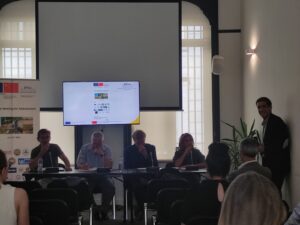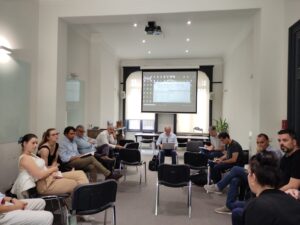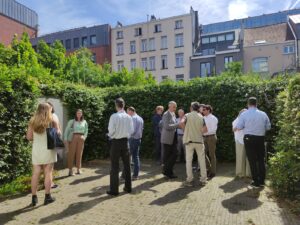SHui Final meeting with stakeholders in Brussels
To summarise the results of the SHui project, our consortium gathered for one last time on 12 / 13 July 2022 in Brussels near to the European Parliament, to ensure our meeting was available to our EU project Officer.
Initially, our project co-ordinator Jose Gomez (IAS-CSIC, Spain) introduced the project, which capitalised on data provided by a long-term research and monitoring platform (spanning many partners) to further develop crop and hydrological models to determine impacts on soil moisture and crop yields across range of scales (plot, farm and regional). Two key objectives were to develop Best Management Practices (BMPs) to implement under different farming conditions and determine the costs / benefits, while projecting the impacts of these at much larger scales. These objectives set the scene for a series of technical talks that summarised the key results of the project (see programme below).
Juan Jose Alarcón (CEBAS-CSIC, Spain) introduced the potential of deficit irrigation to increase horticultural water use efficiency, with its implementation facilitated by the use of various soil and plant sensors and different crop management zones to allow precision irrigation. Tomas Dostal (CTU Czech Republic) discussed rainfall simulation experiments and mathematical modelling that evaluated the impact of BMPs in different locations (climates) throughout Europe, Israel and China. Mulching especially increased soil water storage up to 5%, while contour tillage, no till and cover crops decreased runoff and sediment load by up to 80%. Gianni Quaranta (UNIBAS-MEDES, Italy) then provided a cost-benefit analysis of applying some of these techniques, demonstrating the connectivity of economic and farm environmental efficiency. Lastly, Gabrielle de Lannoy (KU Leuven, Belgium) utilised advances in remote sensing and regional scale crop modelling to project that Europe’s net irrigation requirement may increase by 30% by the end of the century if climate change continues apace.



Before the coffee break, Ian Dodd (Lancaster, UK) reflected on the challenges of cross-continent collaboration in pandemic times, discussing different models of EU-China engagement while highlighting SHui’s dissemination achievements. After the coffee break, Rosanna Salvia (UNIBAS-MEDES, Italy) provides some insights and recommendations arising not just from the technical work conducted with SHui, but from our engagement with farmer focus groups, highlighting that European policies must incentivise practices to allow a transition to more sustainable farming.
A round table participatory discussion then ensued on how to optimise water use in agriculture, moderated by our project co-ordinator Jose Gomez (IAS-CSIC, Spain) with contributions from:
- Miguel Barnuevo (Union de Pequenos Agricultores, Spain)
- Ana Mª Ferrer (Fenacore, Spain)
- Tim Hess (representing to UK Irrigation Association)
- Dirk Raes (KU Leuven, Belgium)
On the following day, the consortium met to refine plans for the delivery of the project results both to the European Commission, and to our wider stakeholder group.
Agenda of the meeting available here.
Recording of the meeting here.
